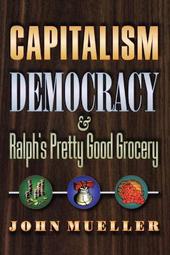
|
Capitalism, Democracy, and Ralph's Pretty Good Grocery
Paperback / softback
Main Details
| Title |
Capitalism, Democracy, and Ralph's Pretty Good Grocery
|
| Authors and Contributors |
By (author) John Mueller
|
| Physical Properties |
| Format:Paperback / softback | | Pages:352 | | Dimensions(mm): Height 235,Width 152 |
|
| Category/Genre | Economic systems and structures |
|---|
| ISBN/Barcode |
9780691090825
|
| Classifications | Dewey:330.122 |
|---|
| Audience | | Professional & Vocational | | Tertiary Education (US: College) | |
|---|
| Illustrations |
2 line illus., 2 tables
|
|
Publishing Details |
| Publisher |
Princeton University Press
|
| Imprint |
Princeton University Press
|
| Publication Date |
19 August 2001 |
| Publication Country |
United States
|
Description
Democracy is overrated. Capitalism, on the other hand, doesn't get enough credit. In this provocative and engaging book, John Mueller argues that these mismatches between image and reality create significant political and economic problems--inspiring instability, inefficiency, and widespread cynicism. We would be far better off, he writes, if we recognized that neither system is ideal or disastrous and accepted instead the humdrum truth that both are "pretty good." And, to Mueller, that means good enough. He declares that what is true of Garrison Keillor's fictional store "Ralph's Pretty Good Grocery" is also true of democracy and capitalism: if you can't get what you want there, "you can probably get along without it." Mueller begins by noting that capitalism is commonly thought to celebrate greed and to require discourtesy, deceit, and callousness. However, with examples that range from car dealerships and corporate boardrooms to the shop of an eighteenth-century silk merchant, Mueller shows that capitalism in fact tends to reward behavior that is honest, fair, civil, and compassionate.He argues that this gap between image and reality hampers economic development by encouraging people to behave dishonestly, unfairly, and discourteously to try to get ahead and to neglect the virtuous behavior that is an important source of efficiency and gain. The problem with democracy's image, by contrast, is that our expectations are too high. We are too often led by theorists, reformers, and romantics to believe that democracy should consist of egalitarianism and avid civic participation. In fact, democracy will always be chaotic, unequal, and marked by apathy. It offers reasonable freedom and security, but not political paradise. To idealize democracy, Mueller writes, is to undermine it, since the inevitable contrast with reality creates public cynicism and can hamper democracy's growth and development. Mueller presents these arguments with sophistication, wit, and erudition. He combines mastery of current political and economic literature with references to figures ranging from Plato to P. T. Barnum, from Immanuel Kant to Ronald Reagan, from Shakespeare to Frank Capra.Broad in scope and rich in detail, the book will provoke debate among economists, political scientists, and anyone interested in the problems (or non-problems) of modern democracy and capitalism.
Author Biography
John Mueller is Professor of Political Science at the University of Rochester. His previous books include War, Presidents, and Public Opinion, Retreat from Doomsday: The Obsolescence of Major War, and Quiet Cataclysm: Reflections on the Recent Transformation of World Politics. He is a regular contributor to numerous academic journals and has written editorial page columns in The New York Times, The Wall Street Journal, and The Los Angeles Times. Outside the field of political science, Mueller has written the prize-winning Astaire Dancing: The Musical Films (Knopf) and cowritten A Foggy Day, a musical presented at the Shaw Festival in Ontario.
Reviews"Many thought-provoking ideas are packed into this nuanced work, and Mueller's case is strong and well-documented."--Library Journal "Mueller is an entertaining guide through economic and political history, using references to Shakespeare, Adam Smith, Hume, Mencken and many more writers to produce deft explanations of complex ideas."--Publisher's Weekly "Mueller's provocative book deserves a wide audience... Mueller writes sharp, brisk, and witty prose that is unfailingly lucid."--Daniel J. Silver, The Weekly Standard
|